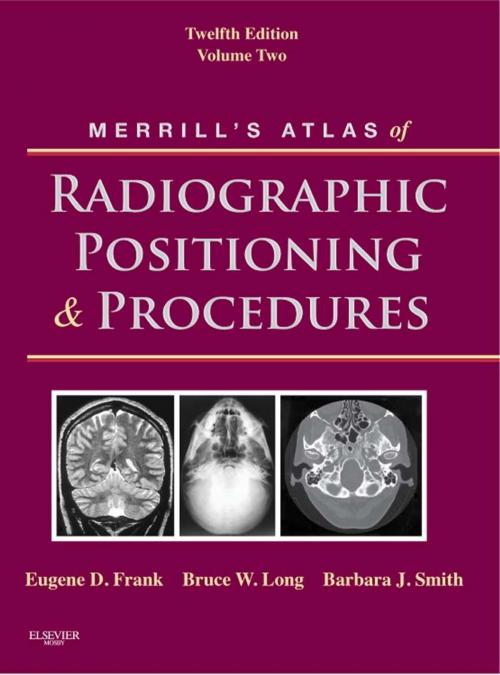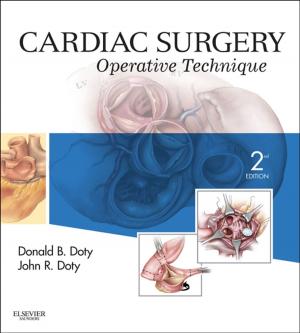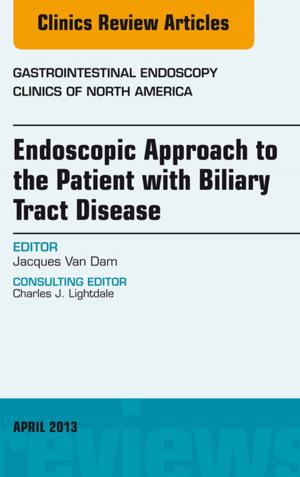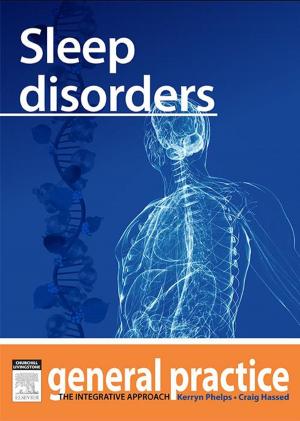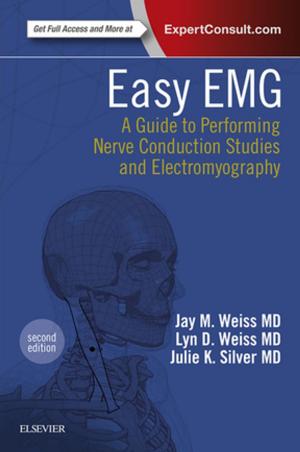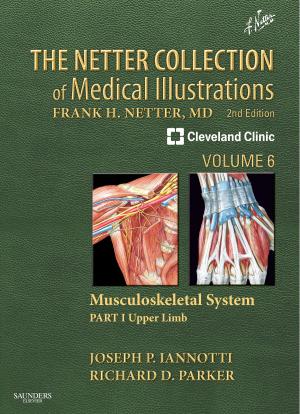Merrill's Atlas of Radiographic Positioning and Procedures - E-Book
Volume 2
Nonfiction, Health & Well Being, Medical, Allied Health Services, Radiological & Ultrasound| Author: | Eugene D. Frank, MA, RT(R), FASRT, FAEIRS, Bruce W. Long, MS, RT(R)(CV), FASRT, Barbara J. Smith, MS, RT(R)(QM), FASRT, FAEIRS | ISBN: | 9780323277808 |
| Publisher: | Elsevier Health Sciences | Publication: | August 13, 2013 |
| Imprint: | Mosby | Language: | English |
| Author: | Eugene D. Frank, MA, RT(R), FASRT, FAEIRS, Bruce W. Long, MS, RT(R)(CV), FASRT, Barbara J. Smith, MS, RT(R)(QM), FASRT, FAEIRS |
| ISBN: | 9780323277808 |
| Publisher: | Elsevier Health Sciences |
| Publication: | August 13, 2013 |
| Imprint: | Mosby |
| Language: | English |
With more than 400 projections presented, Merrill's Atlas of Radiographic Positioning and Procedures remains the gold standard of radiographic positioning texts. Authors Eugene Frank, Bruce Long, and Barbara Smith have designed this comprehensive resource to be both an excellent textbook and also a superb clinical reference for practicing radiographers and physicians. You'll learn how to properly position the patient so that the resulting radiograph provides the information needed to reach an accurate diagnosis. Complete information is included for the most common projections, as well as for those less commonly requested.
-
Comprehensive coverage of anatomy and positioning makes Merrill's Atlas the most in-depth text and reference available for radiography students and practitioners.
-
Essential projections that are frequently performed are identified with a special icon to help you focus on what you need to know as an entry-level radiographer.
-
Full-color presentation helps visually clarify key concepts.
-
Summaries of pathology are grouped in tables in positioning chapters for quick access to the likely pathologies for each bone group or body system.
-
Special chapters, including trauma, surgical radiography, geriatrics/pediatrics, and bone densitometry help prepare you for the full scope of situations you will encounter.
-
Exposure technique charts outline technique factors to use for the various projections in the positioning chapters.
-
Projection summary tables at the beginning of each procedural chapter offer general chapter overviews and serve as handy study guides.
-
Bulleted lists provide clear instructions on how to correctly position the patient and body part.
-
Anatomy summary tables at the beginning of each positioning chapter describe and identify the anatomy you need to know in order to properly position the patient, set exposures, and take high-quality radiographs.
-
Anatomy and positioning information is presented in separate chapters for each bone group or organ system, all heavily illustrated in full-color and augmented with CT scans and MRI images, to help you learn both traditional and cross-sectional anatomy.
-
Includes a unique new section on working with and positioning obese patients.
-
Offers coverage of one new compensating filter.
-
Provides collimation sizes and other key information for each relevant projection.
-
Features more CT and MRI images to enhance your understanding of cross-sectional anatomy and prepare you for the Registry exam.
-
Offers additional digital images in each chapter, including "stitching" for long-length images of the spine and lower limb.
-
Standardized image receptor sizes use English measurements with metric in parentheses.
-
Depicts the newest equipment with updated photographs and images.
With more than 400 projections presented, Merrill's Atlas of Radiographic Positioning and Procedures remains the gold standard of radiographic positioning texts. Authors Eugene Frank, Bruce Long, and Barbara Smith have designed this comprehensive resource to be both an excellent textbook and also a superb clinical reference for practicing radiographers and physicians. You'll learn how to properly position the patient so that the resulting radiograph provides the information needed to reach an accurate diagnosis. Complete information is included for the most common projections, as well as for those less commonly requested.
-
Comprehensive coverage of anatomy and positioning makes Merrill's Atlas the most in-depth text and reference available for radiography students and practitioners.
-
Essential projections that are frequently performed are identified with a special icon to help you focus on what you need to know as an entry-level radiographer.
-
Full-color presentation helps visually clarify key concepts.
-
Summaries of pathology are grouped in tables in positioning chapters for quick access to the likely pathologies for each bone group or body system.
-
Special chapters, including trauma, surgical radiography, geriatrics/pediatrics, and bone densitometry help prepare you for the full scope of situations you will encounter.
-
Exposure technique charts outline technique factors to use for the various projections in the positioning chapters.
-
Projection summary tables at the beginning of each procedural chapter offer general chapter overviews and serve as handy study guides.
-
Bulleted lists provide clear instructions on how to correctly position the patient and body part.
-
Anatomy summary tables at the beginning of each positioning chapter describe and identify the anatomy you need to know in order to properly position the patient, set exposures, and take high-quality radiographs.
-
Anatomy and positioning information is presented in separate chapters for each bone group or organ system, all heavily illustrated in full-color and augmented with CT scans and MRI images, to help you learn both traditional and cross-sectional anatomy.
-
Includes a unique new section on working with and positioning obese patients.
-
Offers coverage of one new compensating filter.
-
Provides collimation sizes and other key information for each relevant projection.
-
Features more CT and MRI images to enhance your understanding of cross-sectional anatomy and prepare you for the Registry exam.
-
Offers additional digital images in each chapter, including "stitching" for long-length images of the spine and lower limb.
-
Standardized image receptor sizes use English measurements with metric in parentheses.
-
Depicts the newest equipment with updated photographs and images.
